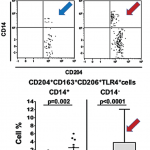The key to understanding macrophages is the MAP-kinase (MAPK) p38 signaling pathway, said Dr. Clark. MAPK p38 inhibitors were discovered in a search for compounds that prevented macrophages from producing TNF. These compounds also reduced the expression of several other inflammatory factors. Although MAPK p38 inhibitors showed promise in experiments, these drugs haven’t proven to be effective at treating RA. That may be because we don’t yet completely understand how the MAPK p38 pathway works or how best to use these inhibitors, he said.
‘There’s also a striking similarity between the C9 polarization state & synovial fibroblast-trained macrophages. What underlies this synergy?’ —Lionel B. Ivashkiv, MD
The MAPK p38 signaling pathway exerts far-reaching control over inflammation, mainly by regulating the activity of the protein tristetraprolin (TTP), said Dr. Clark.
“We know that TTP is an anti-inflammatory protein because mice that don’t have TTP overproduce TNF and develop arthritis,” he said. “However, we can find lots of TTP in the joints of people with arthritis. For a long time, this has been puzzling. Now, we understand that TTP can be inactivated by MAPK p38. We think that the TTP we observe in rheumatoid joints must be inactivated, allowing TNF and other damaging factors to be overproduced.”

Dr. Clark
In one study, mice were genetically modified so that TTP could not be inactivated by MAPK p38, and these mice were dramatically protected against the development of arthritis, he said.9
The challenge now is to find a way to repair or reinforce the macrophage’s natural off switches, said Dr. Clark. One way to do this may be to reactivate dormant TTP in joints affected by rheumatoid arthritis. Clinical trials of MAPK p38 inhibitors have been disappointing, and interest in further studying these compounds has waned, he said. However, research to unravel how the MAPK p38 signaling pathway works is worth pursuing for future therapeutic targets. “In the future, drugs based on these compounds may be used to treat RA,” he said.
Susan Bernstein is a freelance medical journalist based in Atlanta.
Second Chance
If you missed this session, it’s not too late. Catch it on SessionSelect.
Age & Protein in inflammation
Two other presenters also shared highlights of their research in the session, Cytokines, Mediators, Cell-cell Adhesion, Cell Trafficking and Angiogenesis Poster II:
Age Matters
Looking into “Age-Related Differences in Collagen-Induced Arthritis,” Tracy Wilson-Gerwing, PhD, a research fellow at the University of Saskatchewan in Canada, discussed why joint inflammation may not have resolved as well in young adult rats compared with juveniles.10
